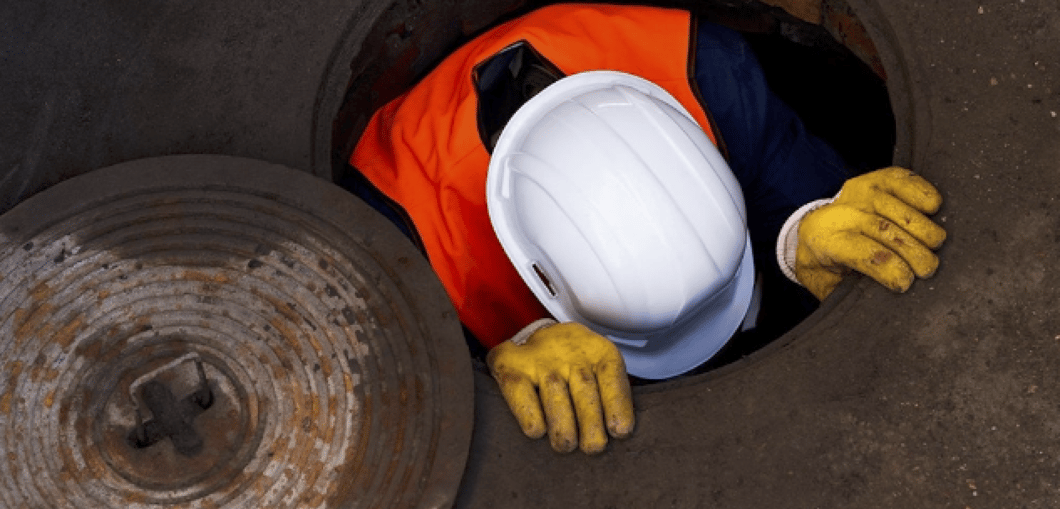Staying Up on Safety Underground: Your Guide to Certifications and Regulations in the Sewer Industry
According to the US Bureau of Labor Statistics:
For every 100 employees in the water, sewage and other systems industry, 5.3 employees were injured in 2019 (OSHAcademy).
3.1 out of every 100 employees were injured severely enough to cause them to miss work or require a job transfer or restricted job duties. (OSHAcademy).

Navigating the underground sewer system is one thing – navigating industry certifications and regulations is another. Before you gear up to go underground, there are a few things you should know about the certifications and regulations that keep you and your crew safe.
Certified Job Security
Obtaining the right certifications and meeting industry regulations is not just a safety precaution, though – it’s an investment in job security and career advancement. Workers with more certifications not only demonstrate their proactiveness but offer proof that they will not be a liability on the job.
Here are three certifications that will keep you safe, compliant, and on your employer’s good side:

Confined Space Certification:
Being caught between a rock and a hard place is a regular occurrence in the sewer industry.
Did you know that 89% of confined space fatalities occurred with jobs authorized by supervisors, and 80% of fatalities happened in locations that have been previously entered by the same person who later died? (OSHA).
Obtaining your confined space certification could save your life or the life of someone you’re supervising. This certification teaches workers how to safely navigate tight and potentially hazardous environments, covering proper ventilation techniques, emergency procedures, and more.
Who should take it:
√ Persons supervising confined space entry
√ Anyone entering and working within a confined space
√ Attendants – persons tasked with assisting with the entry, but not actually entering themselves
- $75 (40% off for a limited time)
- 1-hour completion
- 100% online
- Unlimited exam attempts
- 2024 OSHA 1926 & 1910 Compliant
- It is recommended that you refresh Confined Space Training every 1-2 years
Get your OSHA Confined Space Certification here.

Hazardous Waste Operations and Emergency Response (Hazwoper) Certification
The Hazardous Waste Operations and Emergency Response (Hazwoper) Certification is required for workers who may be exposed to hazardous materials while performing their duties. Sewer workers may encounter hazardous substances such as chemicals, gases, or biological contaminants, making Hazwoper Certification essential for ensuring their safety.
Should I Take The 8-Hour, 24-Hour, or 40-Hour Training?

8-Hour: If you completed the 40-hour or 24-hour training, you must take the 8-hour refresher course annually.
The Deets:
- Price: $39
- 8-hour completion
- 100% online
- Unlimited attempts on every quiz and final exam
Register for the 8-hour training here.
.png?width=203&height=207&name=hour(24).png)
24-Hour: This training is for Individuals who will occasionally come in contact with hazardous materials and are not involved in cleanup operations.
The Deets:
- Price: $179
- 24-hour completion
- 100% online
- Unlimited attempts on every quiz and final exam
Register for the 24-hour training here.
.png?width=229&height=203&name=hour(40).png)
40-Hour: The 40-hour training is for employees who regularly work with and clean up hazardous materials.
The Deets:
- Price: $245
- 40-hour completion
- 100% online
- Unlimited attempts on every quiz and final exam
Register for the 40-hour training here.

Water Operator Certification
Per the American Water Works Association, wastewater treatment operators must adhere to state and regional certification requirements. The process is summarized in their downloadable certification explanation guide:
Where to start:
Step 1: Search WPI’s OpsCert Program Contacts database to find the certifying authority for your state or region to determine which exam(s) ou need to take.
Step 2: Download the “Need to Know Criteria” for the certification(s) you need.
Step 3: Plan for 3-6 months of test preparation and expect a $75-100 exam fee.
Be sure to check with your local authorities or industry associations to determine the exact requirements for your area.
Regulations
But certifications are only part of the equation. To truly excel in the sewer industry, you also need to be well-versed in the regulations that govern your work. From local ordinances to federal laws, there is no shortage of rules and regulations that you need to follow to ensure compliance and safety.
Choosing the Right Training
General Industry training is appropriate for workers in any industry outside of construction, agriculture, or maritime. Sewer workers should select the General Industry training (10 hours for employees and 3 hours for supervisors).
Refer to this infographic by Lancaster Safety for a breakdown of required and elective topics and time requirements:
 Go Above and Beyond, Underground
Go Above and Beyond, Underground
How can you ensure that you’re staying safe and compliant in the sewer industry? Here are a few reminders to help you go above and beyond:
- Stay up-to-date on certifications: Make sure you’re always current on your certifications and training requirements. Renewals and recertifications, like the Hazwoper 8-hour refresher course, are often necessary to maintain compliance.
- Subscribe to worker safety news: Subscribe to newsletters like OSHA’s Quicktakes to receive workplace safety news and be alerted of webinars and seminars.
- Stay up on new technologies: Advancements like AI-powered sewer management are making the industry safer than ever before. SewerAI stops disasters before they happen by accelerating daily field production up to 2x faster. Learn more at www.sewerai.com/
By following these tips and staying informed about certifications and regulations, you will be able to get ahead underground.
References
“24-Hour Hazwoper Online Training Course.” OSHA Education Center, www.oshaeducationcenter.com/hazwoper/24-hour-training/
“40-Hour Hazwoper Online Training Course.” OSHA EducationCenter, www.oshaeducationcenter.com/hazwoper/40-hour-training/
“8-Hour Hazwoper Annual Refresher Training Online.” OSHA Education Center, www.oshaeducationcenter.com/hazwoper/8-hour-training/
“Ace Your WPI Standardized Exams with Our Need-to-Know Criteria.” WPI, www.gowpi.org/services/abc-testing/need-to-know-criteria/
“Comprehensive Guide: Water & Wastewater Treatment Programs.” WPI, www.gowpi.org/certification/opcert-program-contacts/
“Confined Space Certification.” National OSHA Foundation, https://shorturl.at/tuGJ8
“Onsite General Industry Safety Training: OSHA 10 & 30 Hour.” Workplace Safety Consulting: OSHA Training & Compliance, www.lancastersafety.com/services/onsite-safety-training/general-industry-10-30-hour/
“Water and Sewer Industry Safety Training .” OSHAcademy, www.oshacademy.com/pages/business-solutions/water_sewer_industry_safety.html
“Water Operator Certification Explained.” American Water Works Association, www.awwa.org/Portals/0/Awwa/Professional%20Development/OperatorCertificationGuide.pdf
